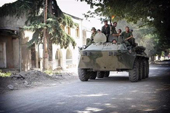Another death in the conflict zone
By Temuri Kiguradze
Monday, November 17

According to the Georgian Interior Ministry the policeman was attacked by Abkhazian militia whilst patrolling Pakhulani village, located on the Georgian side of the border. After the firing at the policeman the militia returned to Abkhazia. According to the Ministry the militia were trying to place land mines in the village and the Georgian policeman tried to hinder them. Several mines which are yet to be activated were found at the place of the incident. The Ministry also stated that in the same location mine blasts had killed cattle on November 14.
The separatist authorities have come out with their own version of this incident. According to Ruslan Kishmaria, interview by Russian Ekho Moskvy radio, a “Georgian sabotage group” had tried to penetrate the border and the Abkhazian militia “was forced” to open fire on the Georgians. The separatists confirm that they killed one policeman and add that two others were wounded. No injuries on the Abkhazian side were reported. Kishmaria stated that the incident was a provocation by Georgia designed to help it find out how well the “Abkhazian border is secured.”
An EU Monitoring Mission in Georgia (EUMM) spokesperson said monitors were still investigating the incident. He said they were “concerned” about the shooting, calling on all sides “to show restraint.” Incidents near the borders of the breakaway territories are happening on a regular basis. The previous one occurred at the South Ossetian border a week ago when two Georgian police officers died in a bomb explosion.
Meanwhile the Georgian media reports that South Ossetian troops are to leave the Georgian village of Perevi, also located on its border, and be replaced by Russian troops. EUMM has stated that the militiamen have left. A spokesperson for the Mission confirms that Russian soldiers are back in the village and are busy establishing a checkpoint there. French President, Nicolas Sarkozy, welcomed the South Ossetian withdrawal from the village and said at a news conference in Washington, as quoted by AFP: “This reassures me that [Russia’s President] Medvedev is a partner with whom we must maintain a dialogue." Several days previously Ossetian militia had entered Perevi, and separatist leader Eduard Kokoity had announced that “Perevi belongs to South Ossetia” and that the militia were going to “establish the state border of South Ossetia” in the village. Before the Ossetian invasion the village had been occupied by Russian soldiers who didn’t prevent the militia from taking control of Georgian-populated Perevi. Local citizens, interviewed by Georgian TV channels, stated that they had been the subject of aggressive actions by the Ossetians, and that the majority of women and children had left their houses.
The problem of displaced persons was addressed during the recent visit of Thomas Hammarberg, the Council of Europe's Commissioner for Human Rights, to Tbilisi. Speaking at a press conference on November 14 he said that there was a problem in trying to persuade breakaway South Ossetia’s authorities to recognize the right of return of those who were forced to flee the region after the August war. Hammarberg, who visited Georgia from November 12-14, had also been in Tskhinvali where he met South Ossetian leader Eduard Kokoity. “They [the separatist government] must state clearly that those who were forced to leave have the right to come back, and the authorities there should accept that. I had a discussion with de facto President Kokoity about this, and I feel there is need to continue that discussion, because I was not satisfied with everything I heard,” he said.
Hammarberg also talked about former refugees who have already returned to villages occupied by Russian and Ossetian troops. There are still reports of “looting and threats and other crimes against individuals,” he said. “The presence of EU monitors has reduced the level of such crimes, but has not stopped them,” Hammarberg said, adding that there was need for “more active monitoring of these areas,” as well as a need for more effective policing on the both sides of the administrative border.
“Some people felt that their villages were still unsafe,” he continued. “In the light of the lack of material goods, the possibility to buy food, they are in a crisis situation in my opinion, both through not feeling safe and not being sure that they can earn living in those areas. There is definitely a need to ensure security and more energy needs to be expended on this by all sides – the police, the EU monitors,” Hammarberg said.
